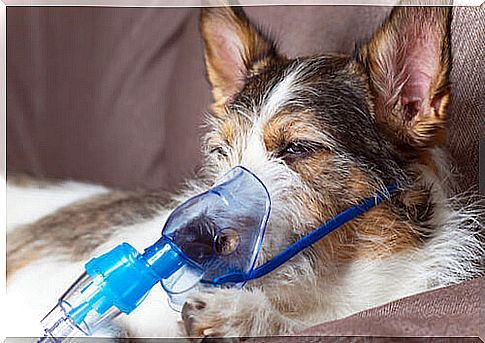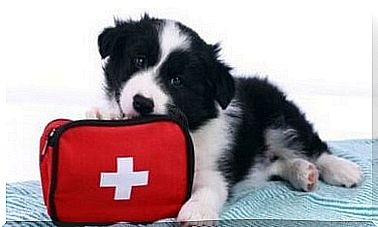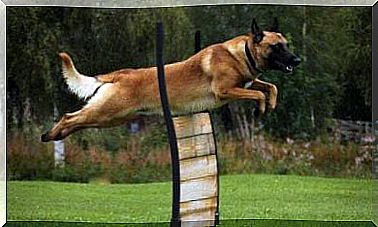Infectious Tracheobronchitis In Dogs: Causes, Symptoms And Treatment

In dogs, infectious tracheobronchitis, also known as kennel cough, is a syndrome caused by viral agents, bacteria and parasites. In many cases, it manifests itself as mild inflammation of the respiratory tree, but in others, unfortunately, it can become fatal bronchopneumonia.
Although it can affect all types of dogs, chronic tracheobronchitis usually affects small dogs. If you want to know more about this very common disease that can affect our animal friends, do not miss this article.
What is infectious tracheobronchitis in dogs?
Infectious tracheobronchitis in dogs is a complex clinical disease. It usually occurs as a side effect of a previous viral infection affecting the respiratory system. Among the most common triggers are the following microorganisms: Bordetella bronchiseptica , canine parainfluenza virus and other microorganisms.
Other triggers that do not fall into the group of viruses and bacteria are parasites: Aelurostrongylus abstrusus , Capillaria aerophila , Crenosoma vulpis and Oslerus osleri . These are examples of pathogens that can cause infectious tracheobronchitis in dogs.
During the disease, the tissues of the respiratory tree become inflamed. As a result, the diameter of the trachea, bronchi and bronchioles is reduced. This prevents the proper entry and exit of air from the lungs. For this reason, the coughs typical of this disease occur.

How does a dog become infected?
The agents that cause the disease are highly contagious. Therefore, the condition is known as “kennel cough”. On the other hand, where there are many animals living in a cluster, an outbreak of the disease is much more likely.
However, even if the dog only lives indoors, he is not fully protected from this pathology. Viruses and bacteria can be transmitted through the air after direct contact with a sick animal. Therefore, if your dog plays with an infected dog during a walk, he can bring the pathogenic microorganism into the house.
Symptoms
Infectious tracheobronchitis in dogs is a disease that affects only the respiratory tissues. The causative agents cause lesions to the bronchi and bronchioles predisposing the animal to subsequent infection by other bacteria. Some of the most common symptoms are as follows:
- Mild form. Characterized by the appearance of a dry cough that can cause vomiting due to the physical effort that the animal takes to cough. The clinical picture generally improves within two to three days after the onset of symptoms. In addition, the total duration of the infection does not exceed seven days.
- Severe form. This variant is more common in puppies. Due to secondary infections, respiratory symptoms are much more severe. Usually, it causes the dog to die.
In addition to the characteristic cough, the dog may present with fever, sneezing, runny nose, swollen tonsils, poor appetite and general listlessness. Unfortunately, respiratory symptoms can last for days or weeks after the infection appears. However, the life of the animal is not in danger.
Treatments for infectious tracheobronchitis in dogs
The type of treatment depends on the causative agent. If it is a virus, you have to wait for the animal’s immune system to fight the infection on its own. Fortunately, the dog usually gets over the infection. However, if the cause is a bacterium ( Bordetella bronchiseptica ), the use of antibiotics is necessary.
In some cases, long-term treatment is required. But don’t worry, symptoms usually go away in one to three weeks. During this time, the vet may prescribe antitussive and anti-inflammatory drugs to relieve symptoms of the disease. Based on your pet’s condition, your vet will tell you which treatment to perform.
Finally, we remind you that there are vaccines for some causative agents, such as those against canine adenovirus. While these vaccines do not 100% prevent you from contracting the disease, they greatly reduce your dog’s chances of getting infected.

A mild disease for most dogs
In most cases, infectious tracheobronchitis in dogs passes on its own. Either way, it’s a good idea to go to the vet before symptoms get worse. Sometimes, the disease is caused by parasites and bacteria that must be eliminated by administering drugs to the animal.
Unfortunately, the clinical picture can be aggravated if this disease affects puppies. Usually, a long period of medical treatment is required in these cases and the prognosis is not always positive.









